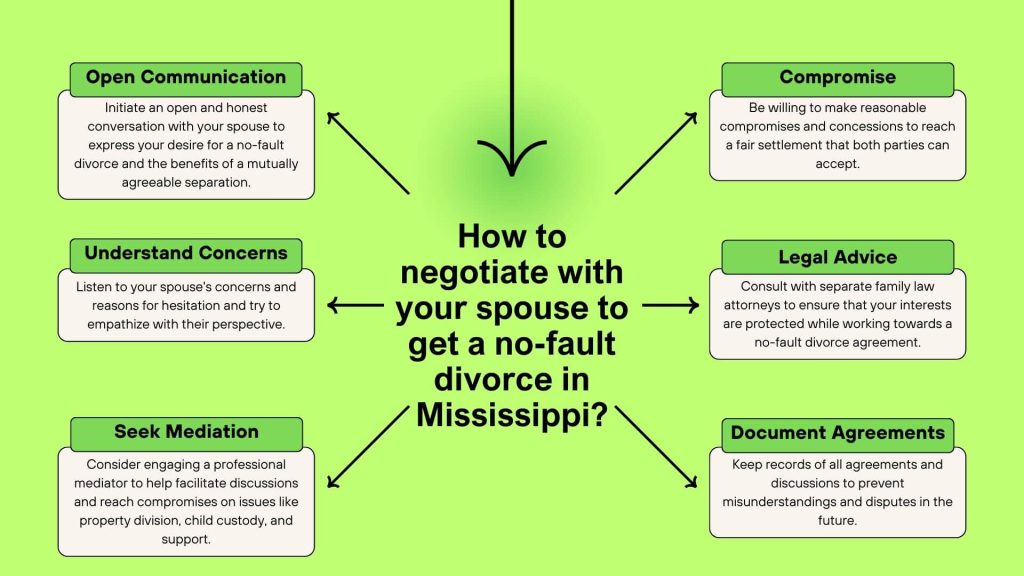To get a divorce in Mississippi, a couple has to be aware of basic laws that regulate this process.
Table of Contents
ToggleIn this article, we will cover the important aspects you need to know before initiating a marriage dissolution. Having learned Mississippi divorce laws, you will be able to avoid possible pitfalls and navigate this complicated process as fast as possible.
Is Mississippi a No-Fault Divorce State?
Yes, it is a no-fault divorce state; however, according to Miss. Code § 93-5-2, you can use a no-fault ground as a reason for divorce only if you file for an uncontested divorce in Mississippi.
The main condition for obtaining such a divorce is being in full agreement with your spouse concerning important aspects of your marriage dissolution that must also be recorded in the marital settlement agreement. Alternatively, your spouse can sign a written consent for a no-fault divorce. It allows couples to go through the Mississippi divorce process faster and more efficiently.
The Grounds for Divorce in Mississippi
There are 12 fault-based grounds and only 1 no-fault reason for a divorce in Mississippi. Read on to find out about the possible legal grounds for divorce you can file upon.
No-Fault Grounds

Filing for a no-fault dissolution means that neither you nor your spouse wishes to allege any wrongdoing that led to the end of your marriage. In Mississippi, there is only one such ground, which is irreconcilable differences. It means you have serious misunderstandings with your spouse, and there is no chance that your marital relationship can be repaired.
Fault-Based Grounds
If either spouse believes that the other party is at fault for the marriage breakup, they will need to initiate a fault-based process and allege one of these 12 grounds:
- Adultery. According to the Mississippi divorce laws, adultery can be regarded as a divorce ground only if the second party did not continue living with the spouse after finding out about their infidelity.
- Willful abandonment. To file upon this ground, you need to prove that your spouse had left the family home more than 1 year ago and does not intend to come back and reconcile.
- Cruelty. Cruel treatment refers to physical abuse or systematically putting the life of the affected spouse in danger. However, the spouse who suffered abuse must be ready to provide evidence of injuries or mutilations.
- Alcohol abuse. If you can prove that your spouse constantly abuses alcohol and this addiction has seriously impacted your marriage, then you can specify it as a divorce ground in the petition.
- Drug addiction. Filing upon this ground is possible if you can provide evidence that your spouse’s addiction has made it impossible for you to continue living together. However, according to Mississippi laws, abusing prescription drugs does not fall under this ground and is rarely considered by the court as wrongdoing.
- Imprisonment. This ground can be used if one spouse is imprisoned without pardon. If you want to get a divorce with an incarcerated spouse, you must provide the judge with a copy of the sentencing order.
- Impotency. To be considered a divorce ground, impotency must be natural and incurable. It is important to note that the second spouse should not have known about it before the marriage was concluded.
- Bigamy. Bigamy is a situation when a person has already been married when concluding a new marriage without a new spouse knowing about it. Consequently, only the spouse who hasn’t been aware of the situation can file on the basis of this ground.
- Close kinship of the spouses. Since incest is considered a crime in Mississippi, spouses filing for a divorce can be sentenced to jail for up to 10 years or will have to pay a $500 fine. In some cases, both measures can be applied. The degree of kinship, which is considered incest, is determined by the Mississippi Code.
- Wife’s pregnancy from another man. The MS courts usually do not grant a divorce if the wife is pregnant. However, if the husband finds out about their spouse’s pregnancy from another man, he may file upon this ground. However, since the court considers the husband the baby’s father by default, additional proceedings may be needed to prove the contrary.
- Mental illness of one of the spouses. Even though it is not considered a wrongdoing, incurable mental illness can still be grounds for a fault-based divorce. A spouse filing for a divorce must prove that they did not know about the second party’s condition before the marriage. It must also be established that the illness is incurable. The spouse must be examined by at least 2 doctors, who will then have to testify in court.
- Confinement in a mental institution. This ground is also not regarded as a spouse’s “fault” but can be a reason for obtaining a fault-based divorce. In this case, the mentally ill spouse must be regularly undergoing treatment and institutionalized for at least 3 years before a divorce case is initiated.
Residency Requirements for Filing for Divorce in Mississippi

In MS, you or your spouse must live in the state for 6 months before filing. To get a divorce in Mississippi, you have to be sure that the state’s court has jurisdiction over your case. It means that you must meet the residency requirements adopted in the state.
How to File for Divorce in Mississippi?
Here are the main steps for filing for divorce in Mississippi you need to take.
- Check if you qualify. First, you must ensure you comply with the Mississippi residency requirements. Also, if you seek an uncontested dissolution, talk to your spouse and decide on the following questions:
- Who pays child support, and what is the amount?
- Who covers other child expenses (for example, medical bills)?
- Who gets custody of your children?
- Whether one of you requires spousal support or not.
- How will you divide your assets, property, and debts?
- Prepare the paperwork. Collect all the forms and fill them out very attentively. Some forms may include court instructions, which you must follow. Some documents must be signed in front of a notary.
- File the documents. You must come to the chancery court and give the papers to the clerk. Also, you must pay the court fees.
- Serve your spouse. After filing, you must provide your spouse with copies of the paperwork. In MS, you can do it by hiring a sheriff or a process server, asking a third party to deliver the documents, or sending them via certified mail.
What Is the First Step in Mississippi Divorce?
The first step for getting a marriage dissolution in the state is preparing your divorce papers. You will need to collect a specific set of documents that are required to file your case. If you work with a lawyer, they will do it for you.
However, if you seek a DIY divorce, you will need to conduct thorough research to determine which forms are required for your specific case to provide the full package to the court. Finally, it is paramount to ensure that you have filled out each paper with correct information and haven’t missed anything.

Where to File Your Divorce Case?
If you seek a no-fault divorce, you must file the papers with the court in the county of your or your spouse’s residency. If your case is fault-based, then you will have to file in the county where the second party currently lives. The chancery clerk will take your paperwork and assign the number to your case. Please note that during this step, you will have to pay the filing fee.
The Filing Fees for Divorce in Mississippi

There are two separate Mississippi divorce filing fees – $148 and $158 for an uncontested and contested case, respectively. If you cannot afford to cover these fees, you may request the court to waive them, filing the Motion to Proceed in Forma Pauperis.
You can get this paper from the court clerk. In the form, you must provide reasons why you cannot cover the costs. Please note that you will need to specify some financial information, such as your gross income. You will not need to pay anything if the court approves your request.
How Much Does a Divorce Cost in Mississippi?
The average cost of a marriage dissolution in the state is $8,000. A divorce cost in Mississippi largely depends on whether it is contested or uncontested. The expenses on a contested case are approximately $11,000. In general, the more issues you need to resolve, the costlier your divorce will be.
For example, if you and your spouse cannot agree on the custody of your child or the amount of support, you may need to hire third-party experts who will investigate your situation and testify in court so that the judge can make a decision, which in turn makes the price of your divorce rise up.
If you can reach an agreement and seek an uncontested divorce, its cost will decrease considerably. The average rate for an uncontested case in MS is $5,000 if you choose to cooperate with a lawyer. However, if you think about filing on your own, you only need to pay the filing fees and online divorce service fees if you need some paperwork help.
How Long Does a Divorce Take in Mississippi?

It can take from 2 months to more than a year to finalize a marriage dissolution in Mississippi. A timeline greatly depends on the type of divorce you file for. If it is a contested one, it usually takes 1 year for a couple to defend their interests with the help of lawyers and for the judge to grant a final decision. If there are too many issues in the divorce case, then it may take even longer.
If your case is uncontested, you can get your marriage dissolution finalized much sooner, but only after you wait a mandatory period adopted by the state. The waiting period for divorce in Mississippi is 2 months. During this time, a couple can reconcile and then has a right not to proceed with their marriage dissolution.
The judge can start reviewing your case as soon as this period is over. However, the divorce process may take longer than 60 days if the chancery court is overloaded.
Is Mississippi a 50/50 Divorce State?
No, Mississippi is an equitable distribution state. In community property states, all the assets and property are considered commonly acquired by a couple and may be divided 50/50.
On the other hand, judges in the states like Mississippi base their decision on the equitable division principle. It means that before issuing a final judgment, on property division in particular, the judge takes into account many factors, and in the end, spouses may not necessarily get even shares of their assets and property.
How to Split up Assets During a Divorce in Mississippi?

In Mississippi, assets are divided according to the equitable distribution principle. If you seek an uncontested divorce, you can decide how you want to divide your assets before going to court. If the judge considers your division fair, they will approve it. If you fail to agree with your spouse, the court will make the final decision, which can be impacted by several factors:
- Some of the assets are not marital (for example, it can be a gift or inheritance);
- The spouses’ fault;
- Emotional value of the assets;
- Only one of the spouses made a significant contribution to acquiring this or that asset;
- One of the spouses has spent marital money on gambling or extramarital affairs;
- The earning capacity of each party and their financial needs.
Finally, if the couple has debts, they will be divided the same way as assets. For example, if one spouse has acquired a more significant share of debt, they will be ordered to pay more than the second spouse.
How to Divide Property After Divorce?
According to the divorce laws on marital property, it must be fairly divided between spouses. The judge considers various factors when determining how to distribute it unless the couple agrees to divide their property out of court.
The state recognizes two types of property – marital and separate. A property is considered separate and is not subject to a division in the following cases:
- It was acquired by one of the spouses before the marriage;
- It was inherited or gifted;
- It was considered separate in a premarital agreement.
However, if we speak about the family house, the situation gets more difficult since the court usually considers it as marital property. If there are no chances for the couple to agree on its fair division, then the judge will issue the final order, taking into consideration the interests of both parties and their children.
Overall, when granting a decision on property division, the judges pay attention to the following factors:
- Length of marriage;
- The market value of the property;
- Spouses’ financial situation, including taxes;
- Contribution of each party towards acquiring the property (either economic or domestic).
It is important to mention that MS courts always recognize the contribution of a non-working spouse, especially if they maintained the family household and took care of children.
How to Manage Child Support and Alimony Under Mississippi Divorce Laws

In Mississippi, child support is usually paid to the parent who obtains physical custody, which means that the child resides with them most of the time. The amount of payments can be calculated using the Mississippi Child Support Formula.
In general, child support is estimated taking into account the child’s needs and non-custodial parent’s gross income, including tax deductions and other contributions. However, the judge may choose not to grant the amount calculated according to the formula if they find it reasonable. The overall amount may be adjusted considering the various individual needs of a child.
According to the state laws, the obligor, who is a non-custodial parent ordered to pay the support, must pay the following percentage of their gross income:
- 14% for 1 child;
- 20% for 2 children;
- 22% for 3 children;
- 24% for 4 children;
- 26% for 5 and more children.
The obligor will have to financially support their child until they reach the age of 18 years and graduate from high school. If their kid has special medical needs or hasn’t graduated yet, the support obligations may be extended.
A parent can pay in cash, online, or via bank transfers. In case the obligor fails to make payments, the ordered amount can be deducted from their paycheck by the child support enforcement division.
Spouses also have a right to seek financial support if they have temporary difficulties or are not able to continue maintaining the same standard of living they had during the marriage. According to the alimony laws in Mississippi, there are three types of payments – periodic, lump sum, and rehabilitative.
The first kind is the most common one. It is paid monthly and can be later modified. Lump sum alimony is not very frequent in the state due to its specificity. It is usually paid in larger amounts and cannot be modified under any circumstances. Finally, rehabilitative alimony is awarded for a certain period. For example, a spouse seeking support can receive it while undergoing training or obtaining education that will help them find a job.
The judge may order to pay alimony not only to petitioners. If the defendant proves they cannot maintain the old lifestyle, they may receive support from the spouse who has initiated a divorce.
When deciding on spousal support in Mississippi, the judges consider various factors, such as:
- Income level of both spouses as well as tax deductions;
- Couple’s health and age;
- Children’s needs;
- Individual needs and expenses of each party;
- Spousal fault.
How Does Adultery Affect Divorce in Mississippi?
One of the most frequently asked questions among MS couples is, “Does infidelity affect divorce?”. In fact, even though alimony is currently not a punitive measure as it used to be in the past, proven cases of adultery can be one of the decisive factors for a judge.
For example, if it was proved that the infidel spouse had wasted family money on their extramarital affairs, they can be ordered to pay alimony. However, it is only possible if the affected spouse requests periodic support.
The Bottom Line
Undoubtedly, each divorce case is unique, but by being aware of state laws, you can get a faster and less painful marriage dissolution. The information provided above can be helpful for those spouses who do not wish to work with a lawyer and consider other alternatives, such as DIY divorce or online divorce in Mississippi.


Phyllis Tenney is an author with a deep knowledge of family law. Holding a Juris Doctor degree from a prestigious law school, she brings her legal expertise to her writing. Phyllis has a passion for exploring complex familial dynamics, and her novels often delve into the tangled web of relationships, love, and legal intricacies within families. In addition to her literary work, she contributes articles on family law topics to reputable publications and is a sought-after speaker at legal conferences.



